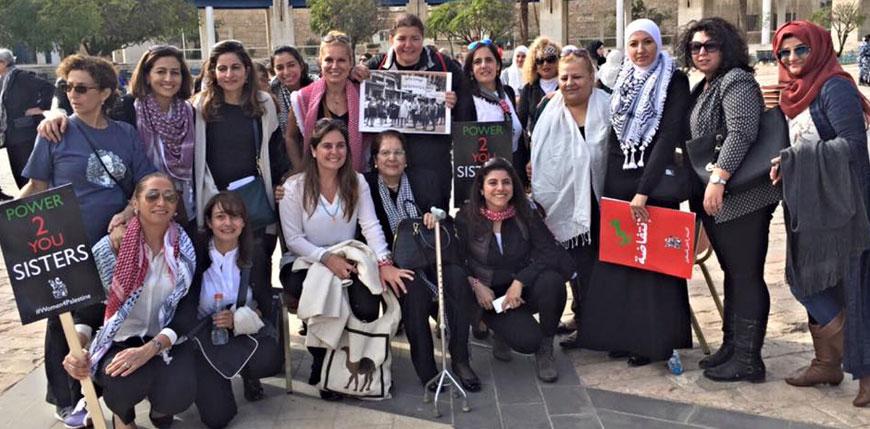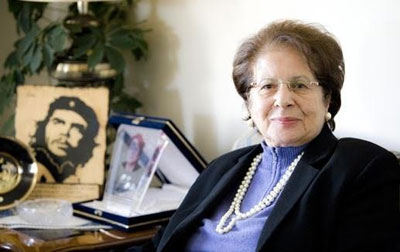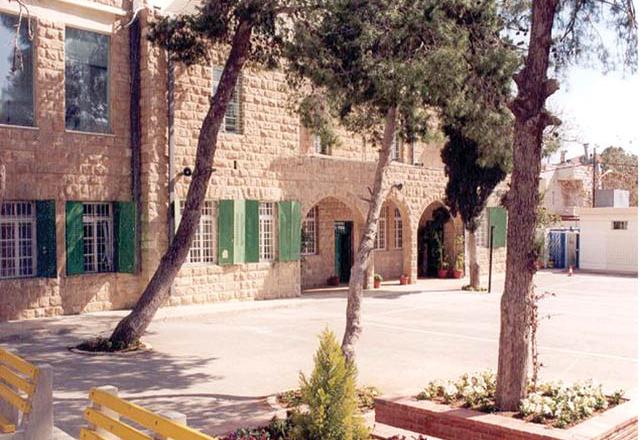You are here
From schoolyard to political arena, woman activist continues struggle
By Suzanna Goussous - Jan 21,2017 - Last updated at Jan 21,2017

Emily Naffa has been involved in social and political activism for nearly 70 years (Photo courtesy of Jordan Communist Party)
AMMAN — From her school’s rooftop in 1948, Emily Naffa delivered a speech condemning the Israeli occupation of Palestinian territories.
Foreseeing an activist in the making, teachers told her: “You will have a future in politics.” The words kept ringing in young Naffa’s mind, until she grew into a political activist.
The political and women’s rights activist recalled memories of her involvement in social issues during her school years at Jabal Amman’s Ahliyyah School for Girls — which was previously known as the CMS.
“I remember one day, students from the Bishop’s School for Boys and some girls from my school took to the streets in solidarity with the Palestinians in 1948,” said Naffa, who was born in 1932.
The protest, she said, was banned, and she went to the school’s roof and expressed her rejection of the occupation of Palestine. “The Palestinian cause was the main issue we worked towards and fought for since the very beginning.”
“It was the central cause we fought for. This helped us figure out other problems and challenges in the region. Of the very few women in the political scene, I believed we had to work because the Palestinian cause deserves attention,” she added.
She said although parties nowadays “have more freedoms”, further decisions have been made to promote “normalisation of ties with Israel”, which contradicts the concepts many activists back then had fought for.
“This [the gas deal with Israel] is only the start. We have to resist and fight any sort of cooperation with Israel, as it goes against the national interest of Jordan. As activists, we have to keep voicing our rejection.”
Her activism as a young student was followed by her participation in the local and regional political scene. Naffa joined the Jordan Communist Party in 1954, which she attributed to her brother’s work in the party.
“My interest in political parties was influenced by my brother [Amal Naffa] who was a member of the Communist Party. He realised my passion for politics was not normal. So he made sure to familiarise me with all the literature of the party,” she told The Jordan Times.
She credited Amal’s involvement in politics for paving the way for her to defend her beliefs and the importance of women’s participation in the political scene.
However, women who participate in politics face difficulties of all kinds, not only from family members, but also from their male peers by “not taking women seriously”, Naffa said.
At the Jordan Communist Party, she argued that activists did not have enough space to express their views and engage in social issues, which made many members leave the party.
Other active parties back in the 1950s included the Arab Baath Party, the Democratic Front, the People’s Popular Party, and the Popular Front for the Liberation of Palestine, Naffa said.
The activist faced many challenges after joining the party; the problems, she recounted, included getting fired from a job at a local bank and banning her from leaving the country, which held back her dreams of travelling to Alexandria in Egypt to study journalism.
“These problems did not help me achieve my goals of studying and practising journalism to use it as a tool to defend what I believe in.”
When she was the chairperson of the Arab Women’s Association for over 20 years and the vice chairperson at the Forum for Women’s Rights, Naffa said she tried to combine her interests and beliefs under one umbrella: human dignity.
“I tried through all possible means to demand women’s rights, and defend the Palestinian cause and the dignity of human beings as well as the freedom to express, speak, and to resist in all the methods available,” Naffa said.
Being a woman political activist in Jordan, she said the difficulties she faced only motivated her to move forward, believing in social and political equality.
“I aimed for setting an example for younger women, proving that women can be involved in politics, parties and different types of activism.”
When Naffa started her own family, her responsibilities as a wife and a mother did not stop her from having a role in the political scene, but on the contrary, having a family and more responsibilities encouraged her to “fight for a better tomorrow for all”.
“Every time I look back at days of my activism as a young citizen, I feel relieved that I have been and am fighting in that direction. This fight has created a new concept of women’s involvement in politics that is equal to men’s.”
Related Articles
When the fledgling Transjordan Emirate was struggling with the first steps in its transformation into a modern state, the Ahliyyah School for Girls (ASG) was also doing its part: empowering Jordanian girls through education and knowledge.
AMMAN — Women’s rights activists on Thursday said that the disappointing results for women candidates in the parliamentary elections was exp
AMMAN — Women’s rights activists on Saturday said many achievements were made since the Kingdom was founded 100 years ago, expressing hope t

















